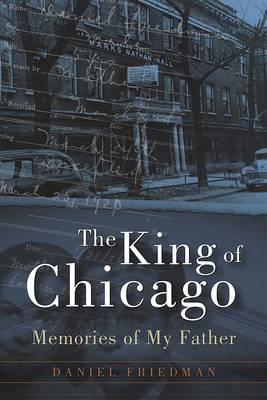
Vous voulez être sûr que vos cadeaux seront sous le sapin de Noël à temps? Nos magasins vous accueillent à bras ouverts. La plupart de nos magasins sont ouverts également les dimanches, vous pouvez vérifier les heures d'ouvertures sur notre site.
- Retrait gratuit dans votre magasin Club
- 7.000.000 titres dans notre catalogue
- Payer en toute sécurité
- Toujours un magasin près de chez vous
Vous voulez être sûr que vos cadeaux seront sous le sapin de Noël à temps? Nos magasins vous accueillent à bras ouverts. La plupart de nos magasins sont ouverts également les dimanches, vous pouvez vérifier les heures d'ouvertures sur notre site.
- Retrait gratuit dans votre magasin Club
- 7.000.0000 titres dans notre catalogue
- Payer en toute sécurité
- Toujours un magasin près de chez vous
Description
The King of Chicago is the story of a father-son relationship as real and hugely loving as that in Philip Roth's Patrimony. At its heart is a young son who tries furiously to heal his father from a violent childhood inside a Chicago orphanage. The orphanage, the Marks Nathan Home, still stands today on the West Side of Chicago, marked by a tarnished, barely legible plaque. Once home to 14,000 Jewish orphans, it is now just another barely remembered relic of a great city. Using original articles from the orphanage newspaper, Friedman attempts to reconstruct and understand his father's childhood, a time that his father never discussed. Expanding its reach, The King of Chicago becomes a multigenerational saga of Jewish life, moving from a mysterious little man named Kasiel, who arrived in the Port of Baltimore in 1903 with two dollars to his name, to the factory floor of a scrap paper business, a golf course where children played without knowing the rules, and a home on the North Shore among fellow immigrants looking for something better for their children. At its core, this memoir is both a snapshot of immigrant life in Chicago in the early twentieth century and a poignant reminder about the need to never forget who you are and where you come from.
Spécifications
Parties prenantes
- Auteur(s) :
- Editeur:
Contenu
- Nombre de pages :
- 184
- Langue:
- Anglais
Caractéristiques
- EAN:
- 9781631440687
- Date de parution :
- 23-05-17
- Format:
- Livre relié
- Format numérique:
- Genaaid
- Dimensions :
- 145 mm x 211 mm
- Poids :
- 317 g







